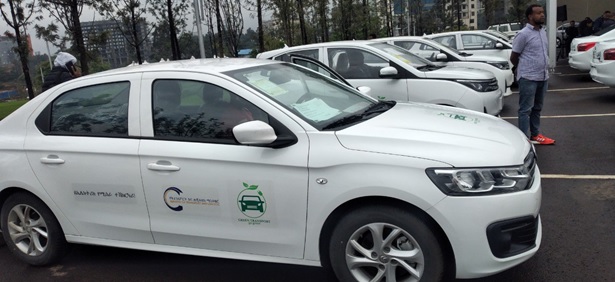
BY HIZKEL HAILU
Documents stated that Electronic vehicles can provide economic benefits to the nation through reducing fuel costs and shifting consumption away from imported oil to more locally produced electricity sources. These fuel savings become additional disposable income that will be spent mostly in the local economy, creating additional jobs. Besides, an electric car is an automobile that is propelled by one or more electric motors, using energy stored in batteries.
On top of that the government of Ethiopia is exhaustively working in modernizing the transport sector coupled with supporting the nation’s economy through introducing new electric powered cars to the country. The Ministry of Transport and Logistics this week launched free one month electronic based transportation services for Addis Ababa residents with 60 electric vehicles that are assisted with 40 charging stations.
The announcement was made at a forum organized by the Ministry of Transport and Logistics in collaboration with Green Teck Africa on the occasion of the Electric Vehicle Awareness Month. Speaking on the occasion, Minister of Transport and Logistics, Dagmawit Moges, said widespread using electric vehicles is the best way to save more than 4 billion USD annually on purchasing fuel. “We call on all Ethiopians to take advantage of the benefits of modern technology coupled with its contribution to the national economy as well as the protection of the environment,” she said.
She further explained that the introduction of 60 electric vehicles are sought to provide comfortable, efficient, modern, and reliable transportation service in the country in addition to replacing fuel consumption and reducing carbon emissions. Accordingly, the ministry is working to replace the growing fuel consumption with renewable energy sources and facilitate the transportation services with environmentally friendly transport system.
“We are working to realize the vision of creating a carbon-free transportation and logistics system in the country through integrating our vast renewable energy potentials with competitive electric based vehicle technology by partnering with stakeholders,” she said. As to her, the Ministry has been taking various initiatives and collaborations with concerned bodies to eliminate carbon emissions through promoting alternate transportation services like bicycle.
Currently, the average take-off time at the airport during landing and runway has been reduced to 3 minutes from 15-20 minutes in the past. In addition, numerous fuel-efficient vehicles (fuel-saving) that have been imported earlier are playing a significant role in saving fuel consumption and facilitating the transportation service as well as combating climate change.
It is estimated that 40 million tons of greenhouse gas emissions will be released in the upcoming 2029/30 and will become time of hurdles to developing countries like Ethiopia. Therefore, encouraging electronic vehicles will bring about significant changes in stabilizing the oil-violate market especially at this period, she noted.
She further said that once charged in charging stations paying only 20 Birr the electronic vehicles can travel an average distance from 200-240 kilometers. Compared to fuel consuming vehicles this can save up to 950 Birr per a vehicle. The 60 electric powered vehicles are provided by Green Tech Africa and the Ministry has planned to introduce 4,800 electric based buses and 148,000 electric based automobiles in its ten years strategic plan.
According to her in the ten-year development plan it was also planned of using 4,800 electric powered buses and 148,000 vehicles in a way to transform the sector’s energy source to renewable energy.
On his part, Water and Energy Minister Habtamu Itefa (PhD) said the Grand Renaissance Dam and other power generating projects will play an important role in ensuring the supply of electricity. Therefore these and other electric vehicles will have a significant impact on power supply, he noted.
He further said that, the introduction of electronic vehicles will have significant advantages through stabilizing the transportation price apart from curbing the growing release of carbon emissions. The developed countries uses electric powered vehicles in their day to day activities due to its affordable price, maintain easily, confortable transportation, and plays wide environmental protection role.
In order to prevent the multifaceted damage caused by fuel; there is a favorable environment for the use of electric vehicles in Ethiopia, adding that, the vehicles have a significant role to play in environmental protection as they do not emit any greenhouse gases into the atmosphere.
The transport service, which mainly uses fuel, has been used in Ethiopia for more than a century and while this has its own benefits, it was not suitable as it was or is harming the environment. Noting that the Ministry is responsible for increasing the supply and distribution of electricity in the country and his office is working to provide fair and equitable supply from various sources.
Citra Ali, Green Tech Africa CEO / Ethiopia, on her part said that her office is pleased to be involved in the expansion of electric vehicles in Ethiopia which is led by the Ministry of Transport and Logistics. She further noted that they are in the process of setting up an electric vehicle assembly factory here in Ethiopia.
As to her, Green Tech Africa has been striving to introduce from three Wheeler (Bajaj) to maximum speeds of vehicles spare parts by assembling locally. Moreover Green Tech Ethiopia is a private firm in Ethiopia which is presenting six kinds of imported rechargeable electric automobiles to the Ethiopian market, with a short-term objective of importing 5,000 vehicles. 60 vehicles will be provided with free transport services in Addis Ababa for one month with the help of 40 charging centers at the national level, it was learnt.
It was stated that electric vehicles are seemingly significant to avoid spending foreign currency for fuel parallel with using for renewable energy in the country and reducing greenhouse gas emissions. It is also stated that it is possible to reduce the emissions of greenhouse gases effect through using renewable energy. As to her, changes are taking place in the transport sector through applying different reform activities.
An electric vehicle can travel an average of 200 to 240 km at a full charge of 20 birr, and if one use the same fuel-powered vehicles, it can cost an average of 20 liters of fuel which costs up to 950 birr. This can clearly demonstrates the practical value of electric vehicles in terms of its consumption.
Noting that the transport sector has highest greenhouse gas emissions in the world and in Ethiopia, she explained that the ministry has given special attention to policy-making in order to address the problem. She also said global warming has also prompted developing countries to look for alternative sources of energy for the transport sector.
According to Dagmawit, reducing the amount of greenhouse gas emissions due to the transport sector in Ethiopia will reduce the amount of carbon dioxide emission and expand the use of environmentally energy alternatives.
She further cited examples of the ministry’s efforts to reduce greenhouse gas emissions in recent years. According to her, the 15- to 20-minute run-off time was reduced by less than three minutes. Accordingly it was able to reduce about 5.2 million liters of jet fuel per year.
Dagmawit said the ministry is working with all stakeholders to expand electric motor and bicycle transport and will contribute to the prevention of greenhouse gas emissions. In terms of using alternative energy sources, more than 29,000 kilograms of gas emissions have been reduced through adopting modern rail transport which covers 756 km nationwide from Addis Ababa to Djibouti and 34 km of Addis Ababa light rail way, in the years between 2019 and 2020 alone, she said.
The Ethiopian Herald July 19/2022





